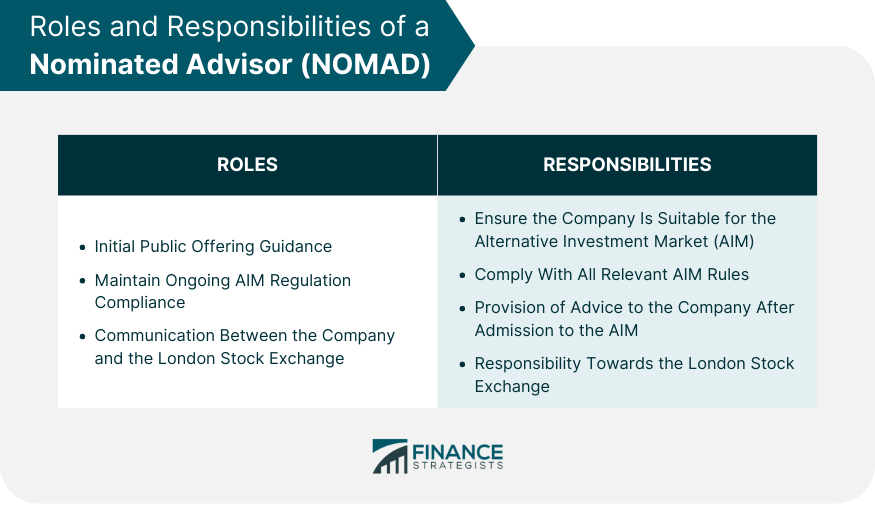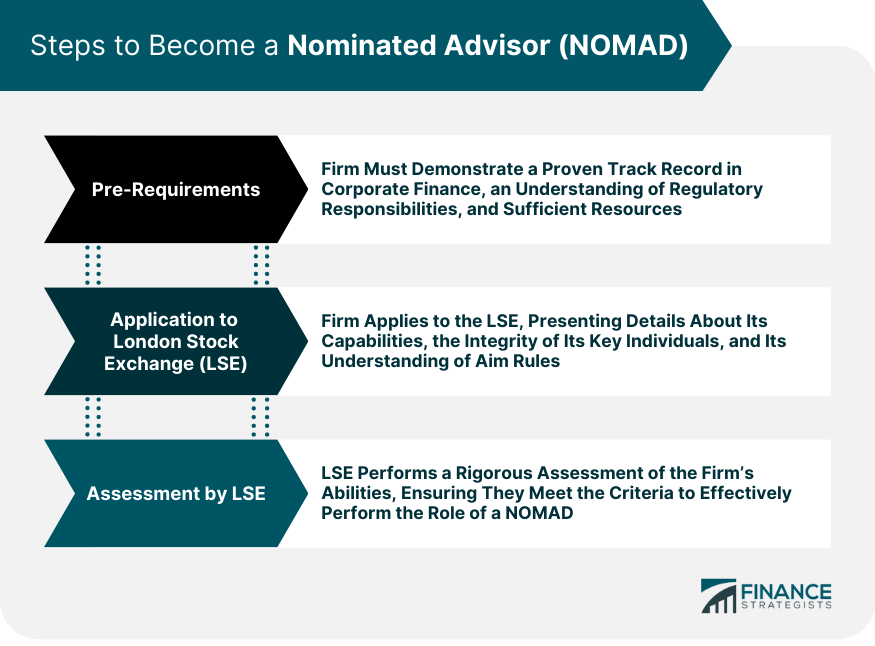A Nominated Advisor, often known as a NOMAD, is a significant figure within the Alternative Investment Market (AIM) in finance. They are critical resources for companies aspiring to list on the AIM. As a trusted guide, a NOMAD navigates these firms through the intricate terrain of financial markets, assisting them to ensure compliance with market regulations and optimize their listing process. Consequently, comprehending the pivotal role and functions of a NOMAD is essential not only for corporate entities seeking listing but also for individual investors considering investments in AIM-listed companies. NOMADs provide valuable advice and guidance during the crucial process of an Initial Public Offering (IPO). When a company decides to go public and lists its shares on the AIM, the process can be overwhelming. NOMADs step in to streamline this process, ensuring that companies meet all the prerequisites for a successful listing. They assist in preparing the admission document, which contains detailed information about the company and its business, serving as a critical resource for potential investors. The role of a NOMAD extends beyond the IPO process. They ensure that companies listed on AIM comply with the continuing obligations under the AIM Rules for Companies, thus maintaining the integrity and smooth functioning of the market. From timely disclosure of price-sensitive information to the prompt reporting of financial results, a NOMAD's responsibilities are comprehensive and ongoing. NOMADs acts as an intermediary between the company and the London Stock Exchange. They are often involved in relaying important information, interpreting rules and guidelines, and facilitating smooth communication to ensure that both parties are on the same page. One of the key responsibilities of a NOMAD is to ensure the company's suitability for listing on the AIM. This involves a comprehensive evaluation of the company's business model, financial status, governance structure, and more. They are also required to provide an eligibility letter to the London Stock Exchange confirming their satisfaction with the company's preparedness for admission. A NOMAD is required to ensure that companies comply with all relevant AIM rules. This includes adherence to rules on disclosure and transparency, corporate governance, and financial reporting, among others. After a company has been successfully admitted to the AIM, the role of a NOMAD doesn't end. They continue to provide critical advice on navigating the complexities of the market, dealing with financial issues, and ensuring compliance with AIM rules. A NOMAD also holds responsibility towards the London Stock Exchange. They are expected to be honest and transparent in their communication with the Exchange, uphold its rules, and act in a way that promotes the integrity of the market. Becoming a NOMAD is not an easy feat and involves a rigorous process. Before a firm can become a NOMAD, it must meet several prerequisites. These include a proven track record in corporate finance, an understanding of the legal and regulatory responsibilities of a NOMAD, and sufficient resources to carry out the role effectively. Once these prerequisites are met, the firm can apply to the London Stock Exchange to become a NOMAD. The application process involves a detailed review of the firm's capabilities, the integrity of its key individuals, and its understanding of the AIM rules. The London Stock Exchange then undertakes a thorough assessment of the applicant firm. This involves evaluating the firm's capability to perform its role effectively, including its resources, corporate finance expertise, regulatory knowledge, and integrity. Corporate governance is a vital element in the financial markets, and NOMADs play a critical role in ensuring its adherence. Good corporate governance is vital for the smooth functioning of a company and for maintaining investor confidence. It involves managing the company in a transparent and accountable manner, ensuring that decisions are made in the best interest of the company and its shareholders. A NOMAD plays a critical role in ensuring corporate governance. They provide guidance to the company on corporate governance issues, ensure that the company adheres to the principles of good governance, and report any breaches to the London Stock Exchange. NOMADs face various challenges in their roles. One such challenge involves dealing with potential conflicts of interest. For instance, NOMADs may also provide additional services to the companies they advise, such as fundraising or financial planning services. This dual role can potentially create a conflict of interest, as the NOMAD could stand to benefit financially from the success of the company's IPO. Maintaining high professional ethics and standards is another challenge faced by NOMADs. They are expected to act with integrity and in the best interests of the market, which may sometimes conflict with the desires of the companies they advise. In the face of market fluctuations and economic uncertainties, NOMADs are expected to provide sound advice and guidance to the companies they advise. This requires a deep understanding of the market and a level-headed approach to dealing with these challenges. NOMADs significantly influence companies and markets. The guidance provided by NOMADs can have a direct impact on the performance and value of the companies they advise. By ensuring that companies meet all the necessary requirements for listing and by guiding them through the complexities of the AIM market, NOMADs can significantly increase the company's chances of success. NOMADs also play a crucial role in maintaining investor confidence and market stability. By ensuring that companies comply with the AIM rules, NOMADs help to promote transparency and integrity in the market, which in turn increases investor confidence. The work of NOMADs significantly impacts transparency and public trust. By ensuring that companies provide accurate and timely information, NOMADs help to create a more transparent market, which in turn fosters public trust. While NOMADs play a particularly prominent role in the UK market, similar roles exist in other jurisdictions. In the UK, NOMADs play a central role in the AIM market. They are responsible for guiding companies through the listing process, ensuring compliance with AIM rules, and providing ongoing advice and guidance. In other markets, similar roles to NOMADs exist, although they may be called by different names. For instance, in the United States, Investment Banks often perform a similar function in guiding companies through the process of listing on a stock exchange. Regulatory differences across jurisdictions can significantly impact the role of NOMADs. For instance, while NOMADs in the UK are regulated by the London Stock Exchange, those in other jurisdictions may be regulated by different bodies, such as the Securities and Exchange Commission (SEC) in the United States. Nominated Advisors (NOMADs) play a crucial role in the financial markets, particularly in the Alternative Investment Market (AIM). They guide companies through the listing process, provide advice on corporate governance, and ensure compliance with AIM rules. NOMADs contribute to the success and value of companies by assisting in Initial Public Offerings (IPOs) and maintaining ongoing regulatory compliance. They also foster transparency, public trust, and investor confidence in the market. However, NOMADs face challenges such as conflicts of interest, maintaining professional ethics, and navigating market fluctuations. While their role is prominent in the UK, similar roles exist in other jurisdictions with varying regulatory frameworks. Becoming a NOMAD involves meeting prerequisites, applying to the London Stock Exchange, and undergoing a thorough assessment. Overall, NOMADs have a significant impact on companies, markets, and the overall integrity of the financial system.Definition of Nominated Advisor (NOMAD)
Role of a NOMAD
Initial Public Offering Guidance
Maintaining Ongoing AIM Regulation Compliance
Communication Between the Company and the London Stock Exchange
Responsibilities of a NOMAD
Ensuring the Company Is Suitable for the AIM Market
Compliance With AIM Rules
Provision of Advice to the Company After Admission to the AIM
Responsibility Towards the London Stock Exchange

Process of Becoming a NOMAD
Pre-requirements for a Firm to Become a NOMAD
Application Process to the London Stock Exchange
Process of Assessment by the London Stock Exchange

NOMADs and Corporate Governance
Importance of Good Corporate Governance
Role of the NOMAD in Ensuring Corporate Governance
Challenges Facing NOMADs
Dealing With Conflicts of Interest
Maintaining Professional Ethics and Standards
Market Fluctuations and Economic Uncertainties

Impact of NOMADs on Companies and Markets
Effects on Company Performance and Value
Influence on Investor Confidence and Market Stability
Impact on Transparency and Public Trust
NOMADs in Different Jurisdictions
Overview of NOMADs in the UK Market
Comparison of NOMADs With Similar Roles in Other Markets
Regulatory Differences Across Jurisdictions
Final Thoughts
Nominated Advisor (NOMAD) FAQs
NOMADs, or Nominated Advisors, play a vital role in the Alternative Investment Market (AIM). They guide companies through the process of listing on AIM, ensure ongoing compliance with AIM regulations, and act as a communication bridge between the company and the London Stock Exchange.
NOMADs have a set of responsibilities towards the company they are advising. These include ensuring that the company is suitable for listing on the AIM, helping the company comply with all relevant AIM rules, and providing ongoing advice and guidance after the company has been admitted to the AIM.
NOMADs face various challenges, including potential conflicts of interest if they provide additional services to the companies they advise. They are also tasked with maintaining high professional ethics and standards and navigating market fluctuations and economic uncertainties.
By ensuring that companies adhere to AIM rules and provide accurate and timely information, NOMADs promote transparency in the market. This transparency fosters public trust and confidence in the financial markets.
The role of NOMADs is likely to evolve with emerging trends in the financial markets. Technological advancements such as AI and blockchain could streamline and enhance the work of NOMADs, creating both challenges and opportunities for them in the future.
True Tamplin is a published author, public speaker, CEO of UpDigital, and founder of Finance Strategists.
True is a Certified Educator in Personal Finance (CEPF®), author of The Handy Financial Ratios Guide, a member of the Society for Advancing Business Editing and Writing, contributes to his financial education site, Finance Strategists, and has spoken to various financial communities such as the CFA Institute, as well as university students like his Alma mater, Biola University, where he received a bachelor of science in business and data analytics.
To learn more about True, visit his personal website or view his author profiles on Amazon, Nasdaq and Forbes.











